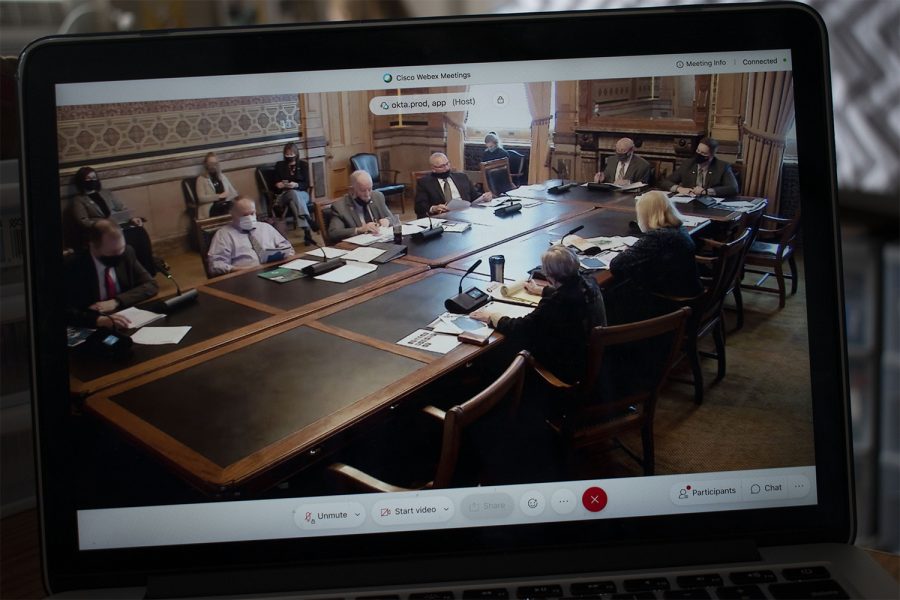Iowa student aid agency reports future enrollment gap for Iowa’s universities
Iowa lawmakers met with Iowa College Student Aid to discuss the FY 2022 budget that will fund college aid for Iowa students.
The Appropriations Subcommittee Meeting is seen taking place on Wednesday, Feb. 10, 2021. The meeting was held over webex due to the ongoing COVID-19 pandemic.
February 10, 2021
The Iowa College Student Aid Commission reported a future college enrollment gap for Iowa’s universities to Iowa lawmakers at an education appropriations subcommittee meeting on Wednesday morning in the Iowa Capitol in Des Moines.
Iowa College Aid said fewer students are applying to college, which will lead to a decline in enrollment.
Mark Wiederspan, Executive Director for Iowa College Student Aid, said enrollment trends before the COVID-19 pandemic showed an enrollment gap from high school students attending secondary schooling. Because of the pandemic, Wiederspan said the enrollment gap is likely to widen because of the COVID-19 pandemic.
“It would suggest to you that all Iowans would have the same equal benefits or the same opportunity to receive these benefits,” he said. “Unfortunately, what we’re finding is that that’s not the case.”
Iowa College Student Aid Commission, a state agency, provides grants and funding to students for post-secondary education opportunities.
In the fiscal 2022 education budget, Iowa Gov. Kim Reynolds recommended $90,154,863 for Iowa College Student Aid. This amount exceeds the requested $79,951,620 of funding from the agency. Wiederspan said Iowa College Aid supports Reynolds’ budget recommendation, which includes a 2.2 percent increase for an Iowa tuition grant and a $10 million increase for the last dollar scholarship, which helps cover fees not provided for by federal aid.
Iowa student aid found a 32 percent difference in college enrollment between non recipients and recipients of free and reduced-price lunch among graduating Iowa high school students in 2019, Wiederspan said.
Rep. Cindy Winckler, D-Davenport, said funding education is important because the median earnings of Iowa residents with associate degrees or higher will positively correlate with the growing of Iowa’s economy.
“The more that we invest in postsecondary information, education, the median earnings also are impacted by the level of education is the key,” Winckler said.
Every dollar appropriated for the Iowa College aid programs go directly to Iowa students to help them repay their college costs, Wiederspan said. He said FY 2020 state funding programs served close to 20,000 Iowans.
Wiederspan said it is especially important to promote post-secondary education in Iowa while college enrollment falls. He said tuition is rising across Iowa’s universities, so financial aid programs cannot keep up to fund the higher tuition.
“Some students are less academically prepared for college level courses, which affects their access to and success in college. A second explanation would be that there’s an increased inability of students to finance their postsecondary degree,” Wiederspan said.
As previously reported by The Daily Iowan, the regents reported a four-year enrollment decline in November. In fall 2020, the regent university enrollment fell by 4.4 percent, amounting to a decrease of 3,333 students.
Rep. Brent Siegrist, R-Council Bluffs, raised the question of what the simplification process of the Free Application for Federal Student Aid would change in the future.
“From Iowa College Aid we are still in the process of determining how will that new FAFSA disrupt any distribution or financial aid programs that is something that we do need to look at,” Wiederspan said.
Wiederspan said in the future there will be an increase of jobs as baby boomers retire.
“There will be a gap and there will be a high demand for those positions to have some kind of postsecondary degree,” he said. “So, it’s vitally important that we consider that as we look for policies to address that notion.”



